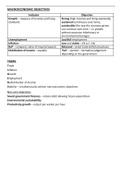Class notes
Macroeconomics: Domestic Economy
- Course
- Institution
- Book
Macroeconomic objectives Circular flow of income Aggregate demand Aggregate supply Multiplier and accelerator effect Macroeconomic equilibrium Output gaps Economic cycle Economic growth Inflation Fiscal, monetary, and supply-side policies
[Show more]




